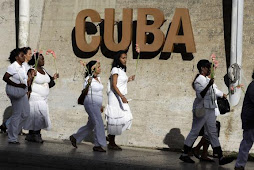November 11, 2011
Dalia Acosta
HAVANA TIMES, Nov. 11 (IPS) — Communist Party and gay rights activist,
journalist and blogger Francisco Rodríguez has triggered an online
debate in Cuba by calling for sexual diversity to be identified in the
next census, due in September 2012.
Better known by the name of his blog, Paquito el de Cuba, Rodríguez has
urged the national statistics office, ONEI, to follow the lead of other
countries that have begun to identify same-sex couples and families in
the 2010 round of global censuses approved by the United Nations.
"Gay, lesbian, bisexual and transgender (GLBT) people must demand that
our families are counted in the census – the largest piece of social
research conducted by any given country – notwithstanding the fact that
our laws still do not recognize any form of legal union for same-sex
couples," he posted on his blog Monday Nov. 7.
If this happens, Cuba would join countries like Argentina, Australia,
Brazil, Chile, Costa Rica, Italy, the United States and Venezuela which,
in their separate ways, have incorporated questions related to sexual
diversity in their national censuses.
"Those who wish to be recognized as the real families they are,
including the possibility that these couples may be raising the
biological children of one or both partners, should be given the
opportunity to do so," Rodríguez told IPS in an e-mail.
The journalist acknowledged that the point of such a decision would not
be to assess the number of same-sex couples, which would be
under-reported because of the invisibility that "surrounds these couples
as a result of cultural homophobia," as well as other problems facing
people living together, such as the housing shortage.
However, he said, "there are many family models that are not socially
recognized, that the census could help to count and describe," to raise
awareness about sexual diversity and to contribute key information when
political and legislative decisions are made that affect these
population groups.
"Paquito's" latest post began to circulate immediately through social
networks like Facebook, and was forwarded to e-mail contact lists and
through personal communications on the island by people defending sexual
rights as human rights.
It also provoked reactions from people whose outlook remains influenced
by the "machista" culture, and who regard heterosexuality as the only
acceptable option.
In his blog post, Rodríguez said he had access to a letter from Mariela
Castro, head of the state National Sex Education Centre (CENESEX),
asking ONEI to consider including questions in the census to help
identify the different kinds of families.
Earlier, Malú Cano of CENESEX's Red Trans, a network of transvestite and
transgender people, had raised the need to include gender identity in
the country's statistics. "What is nameless does not exist. And we do
exist," said Cano at the Second National Meeting of Transgender
Promoters of Sexual Health in mid 2011.
One argument against the proposal is that the pilot trial for the next
census was already held last September, to test the methodology that
will be used by some 69,000 census takers, mostly volunteer students and
teachers in technical and university education.
Rather than delay implementation of the proposal until the next census a
decade away, a national survey to gain a broader specific view of sexual
minorities could be carried out, but this would require additional
resources and political will.
In any case, the proposal by CENESEX and activists like Rodríguez rests
on the draft document for discussion at the January 2012 national
conference of the governing Cuban Communist Party, which affirms the
need to overcome prejudice and discrimination on the grounds of gender
and sexual orientation.
"It makes sense to me that if a country wants to know about the social
and demographic features of its population, it should take measures to
collect reliable statistics. In this case, same-sex couples are a
feature just like any other, for instance the number of heterosexual
couples living together," Rogelio Manuel Díaz told IPS.
Díaz, a nuclear physicist and the author of the blog Bubusopia, holds
the view that this course of action would allow the 2012 census to
"reflect reality, rather than an imaginary picture that would inevitably
ignore, exclude and certainly discriminate against part of the population."
According to Rodríguez, who writes for the trade union weekly
Trabajadores, if same-sex couples and families were included in the
census, it would be an important tool to persuade parliament to approve
a bill recognizing equal rights for heterosexual and homosexual couples.
It would also be a key step towards enacting a Gender Identity Law with
the aim of guaranteeing full social inclusion for transgender persons.
Yasmín Silvia Portales, a feminist and supporter of the rights of people
with different sexual orientations and gender identities, told IPS that
"one of the excuses used to justify denying GLBT groups their full
rights, and failing to admit that they are victims of discrimination, is
that there are so few of us.
"The census is a good opportunity to explode this myth. GLBT people are
out there, looking after children and elderly people, living together,
getting divorced, studying or working or being supported by our
partners," said Portales, who writes the blog En 2310 y 8225.





No comments:
Post a Comment